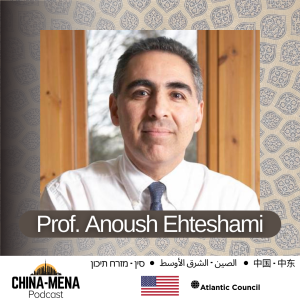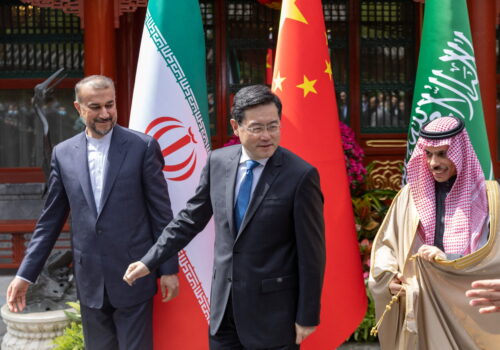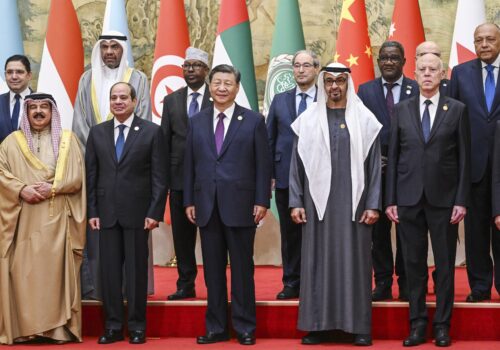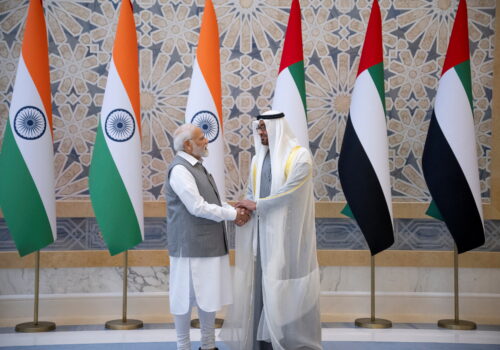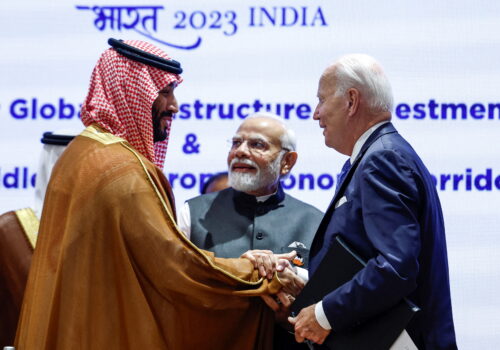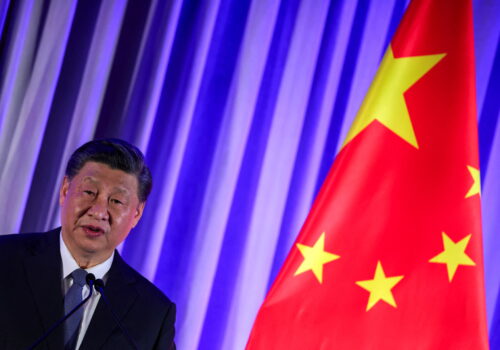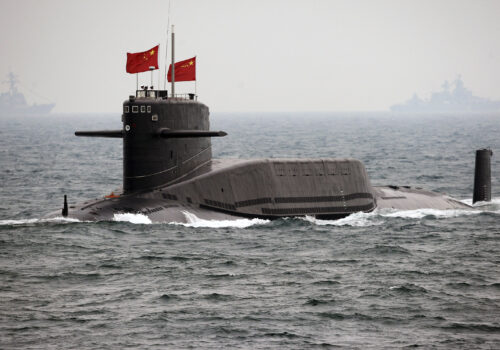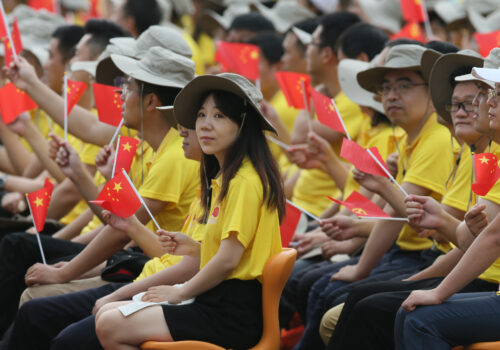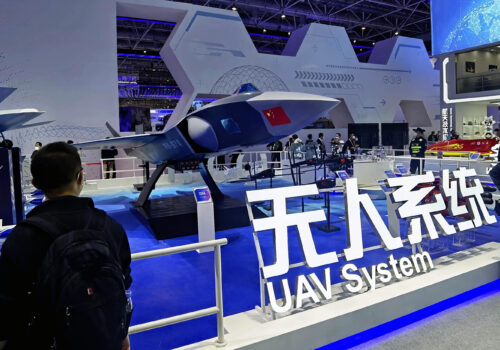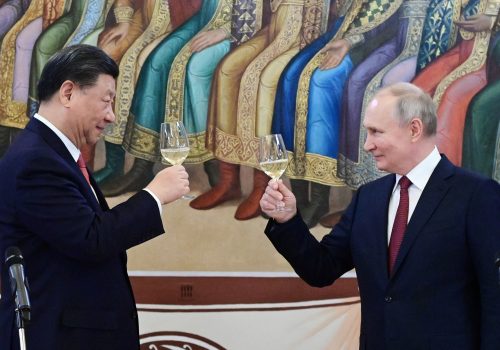中国 – 中东 / الصين – الشرق الأوسط / סין – מזרח תיכון
At a time when China’s global footprint is getting deeper and deeper, it has never been more important to understand its foreign policy. The Middle East is one of the world’s most consequential regions: home to major religions, diverse cultural and social heritage, central to global energy markets, and of course, geopolitics, linking people and markets in Asia, Africa and Europe. The podcast will feature conversations with academics, government leaders, and the policy community to provide insights into how China’s evolving role in the Middle East affects intra-regional development, trade, security, and diplomacy.
Hosted by
Find the China-MENA podcast on the app of your choice
STAY UPDATED
Subscribe below for the latest updates from the China-MENA Podcast
Season 1
Subscribe to China-MENA Podcast on your favorite podcast platform to stay up-to-date with upcoming episodes, and do not forget to rate us and leave us a review.
 Our pilot episode marks the launch of the China-MENA podcast, a monthly program that goes beyond the headlines to provide a deeper look at engagement between China and countries in the Middle East – North Africa and give our listeners a better understanding of an important emerging geopolitical shift. Listen here!
Our pilot episode marks the launch of the China-MENA podcast, a monthly program that goes beyond the headlines to provide a deeper look at engagement between China and countries in the Middle East – North Africa and give our listeners a better understanding of an important emerging geopolitical shift. Listen here!
Episode 1: Sino-Iranian relations
Professor Anoushrivan Ehteshami joins us to discuss China and Iran relations and the state of the bilateral relationship, including the comprehensive strategic partnership the two countries finalized last spring, the possibility of Iranian membership in the Shanghai Cooperation Organization, and China’s role in the JCPOA. Listen here!
Episode 2: Chinese community building in the Middle East: Chinese in Dubai
 Dr. Yuting Wang joins us to discuss Chinese Community Building in the Middle East, and how increased migration in recent decades has aided in the development of China-Gulf ties, with the UAE being one of the nations with a significant Chinese population. Dr. Wang will also explore the influence of Chinese communities in the UAE, and the social relationships between Chinese and locals. Listen here!
Dr. Yuting Wang joins us to discuss Chinese Community Building in the Middle East, and how increased migration in recent decades has aided in the development of China-Gulf ties, with the UAE being one of the nations with a significant Chinese population. Dr. Wang will also explore the influence of Chinese communities in the UAE, and the social relationships between Chinese and locals. Listen here!
Episode 3: Chinese Soft Power Projection in MENA
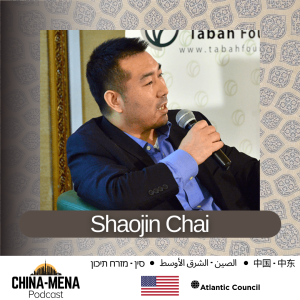 In this episode, we are joined by Shaojin Chai, a professor of international relations at the University of Sharjah to discuss China’s cultural, educational, and religious outreach to the Middle East. Dr. Chai specializes in International Studies, Modern Chinese History, and Political Science. Listen here!
In this episode, we are joined by Shaojin Chai, a professor of international relations at the University of Sharjah to discuss China’s cultural, educational, and religious outreach to the Middle East. Dr. Chai specializes in International Studies, Modern Chinese History, and Political Science. Listen here!
Episode 4: Chinese Multilateralism in MENA
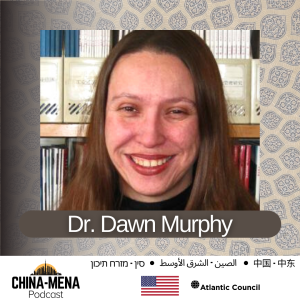 In this episode, we are joined by Dr. Dawn Murphy to discuss China’s multilateral approaches and outreach to countries in the Middle East and North Africa. Dr. Murphy is an Associate Professor of International Security Studies with the Department of International Security Studies at the U.S. Air War College at Maxwell Air Force Base in Montgomery, Alabama. Listen here!
In this episode, we are joined by Dr. Dawn Murphy to discuss China’s multilateral approaches and outreach to countries in the Middle East and North Africa. Dr. Murphy is an Associate Professor of International Security Studies with the Department of International Security Studies at the U.S. Air War College at Maxwell Air Force Base in Montgomery, Alabama. Listen here!
Episode 5: Chinese Tech in North Africa
 In this episode, we are joined by Dr. Tin Hinane El Kadi to discuss Chinese Tech in North Africa, China’s attempt to dominate the digital space in North Africa via tech giants such as Huawei and Alibaba, and the Digital Silk Road. Dr. El Kadi is co-founder and co-director at the Institute for Social Science Research on Algeria (ISSRA) and an Associate Fellow at Chatham House. Listen here!
In this episode, we are joined by Dr. Tin Hinane El Kadi to discuss Chinese Tech in North Africa, China’s attempt to dominate the digital space in North Africa via tech giants such as Huawei and Alibaba, and the Digital Silk Road. Dr. El Kadi is co-founder and co-director at the Institute for Social Science Research on Algeria (ISSRA) and an Associate Fellow at Chatham House. Listen here!
Episode 6: China-GCC Relations
 In this episode, we are joined by Dr. Mohammed Al-Sudairi to discuss China-GCC Relations in terms of people, culture and businesses, the political view of the GCC towards China, how the US-China competition narrative is received by GCC countries, and how people from the Gulf see China. Dr. Mohammed Al-Sudairi is a Senior Research Fellow and Head of Asian Studies Program at King Faisal Center for Research and Islamic Studies (KFCRIS) located in Saudi Arabia. Listen here!
In this episode, we are joined by Dr. Mohammed Al-Sudairi to discuss China-GCC Relations in terms of people, culture and businesses, the political view of the GCC towards China, how the US-China competition narrative is received by GCC countries, and how people from the Gulf see China. Dr. Mohammed Al-Sudairi is a Senior Research Fellow and Head of Asian Studies Program at King Faisal Center for Research and Islamic Studies (KFCRIS) located in Saudi Arabia. Listen here!
Episode 7: Managing US-China Competition – The View from Singapore
 In this episode, we are joined by Ambassador Bilahari Kausikan, former ambassador and Singapore’s Minister of Foreign Affairs, to discuss the influence of the US-China Competition narrative on the Southeast Asia region and differences between the Indo-Pacific region and the Gulf in an era of US-China competition. Ambassador Bilahari and host Jonathan Fulton also discuss the differences between the Gulf region and the SEA region in terms of the people, culture, religion, and perspective in this geopolitical competition between the US and China. Moreover, Ambassador Bilahari states that the SEA region welcomes these extra-national powers within the region, as they help economic growth and maintain the balance of power in the region. Lastly, the Ambassador gives some advice to the Gulf countries regarding US-China geopolitics. Listen here!
In this episode, we are joined by Ambassador Bilahari Kausikan, former ambassador and Singapore’s Minister of Foreign Affairs, to discuss the influence of the US-China Competition narrative on the Southeast Asia region and differences between the Indo-Pacific region and the Gulf in an era of US-China competition. Ambassador Bilahari and host Jonathan Fulton also discuss the differences between the Gulf region and the SEA region in terms of the people, culture, religion, and perspective in this geopolitical competition between the US and China. Moreover, Ambassador Bilahari states that the SEA region welcomes these extra-national powers within the region, as they help economic growth and maintain the balance of power in the region. Lastly, the Ambassador gives some advice to the Gulf countries regarding US-China geopolitics. Listen here!
Episode 8: China in MENA – An EU Perspective
 In this episode, we are joined by Camille Lons, a research associate at the International Institute for Strategic Studies (IISS), currently detached to Taipei, to discuss how Europeans see China as a rising global player in the geopolitics of the Middle East and North Africa and the world. Camille Lons and host Jonathan Fulton also discuss the EU’s response to the rising influence of China in MENA and the world; the areas where the EU and China can cooperate in the Middle East; how China’s growing presence in the region affects EU’s interests; the EU’s position in the US-China geopolitical competition, and China’s strong influence in MENA despite warnings and issues raised by Western allies, among other topics. Listen here!
In this episode, we are joined by Camille Lons, a research associate at the International Institute for Strategic Studies (IISS), currently detached to Taipei, to discuss how Europeans see China as a rising global player in the geopolitics of the Middle East and North Africa and the world. Camille Lons and host Jonathan Fulton also discuss the EU’s response to the rising influence of China in MENA and the world; the areas where the EU and China can cooperate in the Middle East; how China’s growing presence in the region affects EU’s interests; the EU’s position in the US-China geopolitical competition, and China’s strong influence in MENA despite warnings and issues raised by Western allies, among other topics. Listen here!
Episode 9: Arab Barometer and Perceptions of China in MENA
 In this episode, we are joined by Michael Robbins, Director and Co-Principal Investigator of Arab Barometer, to discuss the region’s perception of China based on the Arab Barometer’s surveys, and the different perspectives of the general public versus the elite—as the latter tends to be more favorable toward Beijing. Arab Barometer is a nonpartisan research network that provides insight into the social, political, and economic attitudes and values of ordinary citizens across the Arab world. In the show, Michael also explains the Arab Barometer, its purpose, and how they conduct surveys and collect data. Listen here!
In this episode, we are joined by Michael Robbins, Director and Co-Principal Investigator of Arab Barometer, to discuss the region’s perception of China based on the Arab Barometer’s surveys, and the different perspectives of the general public versus the elite—as the latter tends to be more favorable toward Beijing. Arab Barometer is a nonpartisan research network that provides insight into the social, political, and economic attitudes and values of ordinary citizens across the Arab world. In the show, Michael also explains the Arab Barometer, its purpose, and how they conduct surveys and collect data. Listen here!
Episode 10: China-Israel Relations
 In this episode, we are joined by Brigadier General (Ret.) Assaf Orion, Director of the Diane & Guilford Glazer Israel-China Policy Center at the Institute For National Security Studies (INSS) in Tel Aviv, to discuss the complex Sino-Israeli relationship, Israel’s perspective of China’s Belt and Road Initiative, the Chinese-operated port of Haifa in Northern Israel, China’s meddling in Israeli domestic affairs and its role in the Israel-Palestine question, and Israel’s perspective on China grand strategy on MENA. Listen here!
In this episode, we are joined by Brigadier General (Ret.) Assaf Orion, Director of the Diane & Guilford Glazer Israel-China Policy Center at the Institute For National Security Studies (INSS) in Tel Aviv, to discuss the complex Sino-Israeli relationship, Israel’s perspective of China’s Belt and Road Initiative, the Chinese-operated port of Haifa in Northern Israel, China’s meddling in Israeli domestic affairs and its role in the Israel-Palestine question, and Israel’s perspective on China grand strategy on MENA. Listen here!
Episode 11: China-Global South Relations
 In this podcast’s episode, we are joined by Dr. Lina Benabdallah, a Wake Forest University assistant professor of politics and international affairs. Dr. Lina joins us to provide an overview of China’s influence in the Global South, as well as why China is viewed positively by African countries. She also discusses how China gained positive impressions from Africans and the global implications. Listen here!
In this podcast’s episode, we are joined by Dr. Lina Benabdallah, a Wake Forest University assistant professor of politics and international affairs. Dr. Lina joins us to provide an overview of China’s influence in the Global South, as well as why China is viewed positively by African countries. She also discusses how China gained positive impressions from Africans and the global implications. Listen here!
Episode 12: China’s Vision for a New World Order
 In this podcast’s episode, we are joined by Nadege Rolland, a distinguished fellow of China studies at The National Bureau of Asian Research. Nadege joins us to discuss China’s opposing view against the international order, the Global Development Initiative and Global Security Initiative as alternatives to the western-led global order, China’s narrative to the world as a rising power in the geopolitical stage, and its control and strategy in maintaining power locally and globally. Listen here!
In this podcast’s episode, we are joined by Nadege Rolland, a distinguished fellow of China studies at The National Bureau of Asian Research. Nadege joins us to discuss China’s opposing view against the international order, the Global Development Initiative and Global Security Initiative as alternatives to the western-led global order, China’s narrative to the world as a rising power in the geopolitical stage, and its control and strategy in maintaining power locally and globally. Listen here!
Episode 13: The Middle East in the US-India-China Strategic Triangle
 In this episode, we are joined by Raja Mohan, Senior Fellow with the Asia Society Policy Institute in Delhi. Mr. Mohan joins us to discuss that in addition to China and the US, India also plays role in the geopolitical dynamics within the Middle East. Mr. Mohan will share with us his knowledge about India’s role in geopolitics in the Middle East as well as the perspective of New Delhi on the influence of the US-China tug-of-war within the region, and provide some insights about maritime security in the Indian Ocean and the growing influence of mixed cultures in the Gulf. Listen here!
In this episode, we are joined by Raja Mohan, Senior Fellow with the Asia Society Policy Institute in Delhi. Mr. Mohan joins us to discuss that in addition to China and the US, India also plays role in the geopolitical dynamics within the Middle East. Mr. Mohan will share with us his knowledge about India’s role in geopolitics in the Middle East as well as the perspective of New Delhi on the influence of the US-China tug-of-war within the region, and provide some insights about maritime security in the Indian Ocean and the growing influence of mixed cultures in the Gulf. Listen here!
Special episode: US Perceptions of China’s Middle East Presence
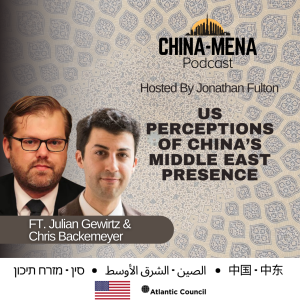 In this episode, we are joined by two esteemed guest from the US State Department: Dr. Julian Gewirtz, Deputy Coordinator for China Global Affairs, and Chris Backemeyer, Deputy Assistant Secretary for Assistance Coordination and Regional and Multilateral Affairs, Bureau of Near East ern Affairs. Our guests provide unique insights from a US perspective on the potential implications of China’s growing presence in the Middle East. They examine the region’s strategic landscape and China’s efforts to replace US dominance in global governance and discuss the challenges and opportunities for cooperation between China and the US in the MENA region, as well as the priorities of the US in the Middle East. Tune in to gain a better understanding of how the US perceives and reacts to China’s evolving role in the region and how recent developments may shape the region’s future and US response. Listen here!
In this episode, we are joined by two esteemed guest from the US State Department: Dr. Julian Gewirtz, Deputy Coordinator for China Global Affairs, and Chris Backemeyer, Deputy Assistant Secretary for Assistance Coordination and Regional and Multilateral Affairs, Bureau of Near East ern Affairs. Our guests provide unique insights from a US perspective on the potential implications of China’s growing presence in the Middle East. They examine the region’s strategic landscape and China’s efforts to replace US dominance in global governance and discuss the challenges and opportunities for cooperation between China and the US in the MENA region, as well as the priorities of the US in the Middle East. Tune in to gain a better understanding of how the US perceives and reacts to China’s evolving role in the region and how recent developments may shape the region’s future and US response. Listen here!
Season 2
Subscribe to China-MENA Podcast on your favorite podcast platform to stay up-to-date with upcoming episodes, and do not forget to rate us and leave us a review.
Episode 1: Global Development Initiative and Global Security Initiative – China’s Blueprint for the New World Order
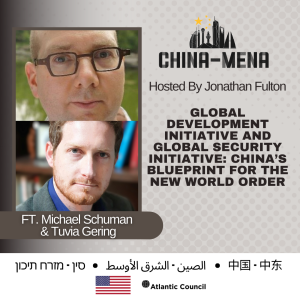
In this episode, we are joined by Tuvia Gering, Nonresident Fellow, Global China Hub, Atlantic Council and a researcher at the Diane & Guilford Glazer Foundation Israel-China Policy Center at the Institute for National Security Studies; and by Michael Schuman, Nonresident Senior Fellow, Global China Hub, Atlantic Council, to explore China’s flagship initiatives, the Belt and Road Initiative and the Northern Initiative, as we attempt to uncover the country’s true intentions in funding and supporting genuine global development projects.
Our esteemed guests shed light on the Chinese Communist Party’s approach and its practical implementation tactics of these global initiatives. They also examine Beijing’s progress support, capacity building, and knowledge-sharing efforts—including global development centers and vocational training programs.
Tune in to gain a better understanding of China’s aspirations in shaping global governance. Addressing challenges and skepticism, this episode offers valuable insights for those intrigued by China’s international outreach strategies and its global development initiatives.
Join us to understand China’s aspirations in shaping global governance. Addressing challenges and skepticism, this episode offers valuable insights for those intrigued by international relations and global development. Listen here!
Episode 2: China’s Role in Conflict Mediation in the Middle East
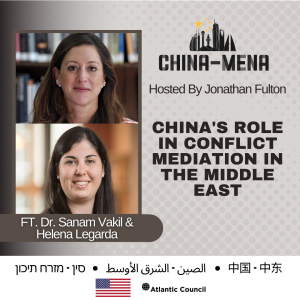
In this episode, we embark on a thought-provoking journey into China’s involvement in conflict resolution within the region. Your host, Jonathan Fulton, is joined by the insightful voices of Helena Legarda and Dr. Sanam Vakil. Together, they dissect China’s strategic approach to mediating conflicts and its consequential impact on the Middle East.
Amidst a landscape seeking fresh perspectives in conflict resolution, a pertinent question emerges: Can China wield transformative influence? As we navigate the intricate terrain, we invite you to delve into the nuances, obstacles, and potential avenues presented by China’s mediation role in this dynamic region.
Brace yourselves for an enlightening discourse that promises to reshape your vantage point on global politics. Listen here!
Episode 3: The Gulf’s New De-Escalation Foreign Policy Among World Powers
I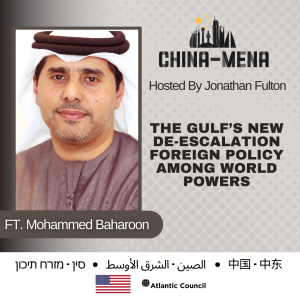 n this episode, our host Jonathan Fulton is joined by esteemed guest Mohammed Baharoon to discuss the shifting dynamics of Gulf countries’ foreign policies– which see the world order based on interconnectedness, not polarity.
n this episode, our host Jonathan Fulton is joined by esteemed guest Mohammed Baharoon to discuss the shifting dynamics of Gulf countries’ foreign policies– which see the world order based on interconnectedness, not polarity.
From the focus on developmental issues and sustainable economies to the changing perspectives on security and power, our experts explore the implications and potential solutions to foster stability in the region, including China’s support for GCC-Iran normalization, Turkey’s improving relations with the UAE and Saudi Arabia, and the Abraham Accords.
Join us as we tackle crucial topics such as the impact of China’s presence in Africa, the concept of de-escalation as a security strategy, and the evolving landscape of geopolitics in the region and the new Gulf of de-escalation. Listen here!
Episode 4: 10 Years On: China’s Belt & Road Initiative and its Future in the Middle East
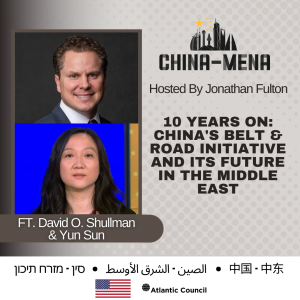 In this episode, titled “10 Years On: China’s Belt & Road Initiative and its Future in the Middle East,” our host Jonathan Fulton is joined by esteemed guests David O. Shullman and Yun Sun to delve into the current state of China’s ambitious Belt and Road Initiative (BRI) and its implications for the Middle East.
In this episode, titled “10 Years On: China’s Belt & Road Initiative and its Future in the Middle East,” our host Jonathan Fulton is joined by esteemed guests David O. Shullman and Yun Sun to delve into the current state of China’s ambitious Belt and Road Initiative (BRI) and its implications for the Middle East.
The episode analyzes the recently held Belt and Road Forum, the involvement of various MENA countries in the initiative, and the challenges and opportunities it presents. Get ready to explore the complexities of China’s global infrastructure plan and its impact on the Middle East, as we discuss the geopolitical dynamics, competing interests, and potential alternatives to the BRI. Listen here!
Episode 5: China and the Israel-Hamas War: A View from Tel Aviv
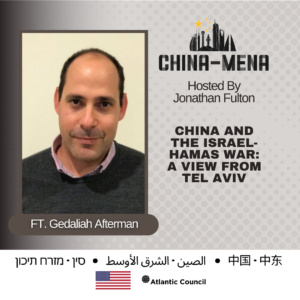 In this episode of China-Mena titled “China and the Israel-Hamas War: A View from Tel Aviv,” host Jonathan Fulton and guest Dr. Gedaliah Afterman engage in a compelling discussion on the intricate dynamics between China, Israel, and the ongoing conflict with Hamas. The conversation delves into China’s evolving stance, economic interests, potential for mediation, and the conflict’s implications on China’s emerging role in the Middle East.
In this episode of China-Mena titled “China and the Israel-Hamas War: A View from Tel Aviv,” host Jonathan Fulton and guest Dr. Gedaliah Afterman engage in a compelling discussion on the intricate dynamics between China, Israel, and the ongoing conflict with Hamas. The conversation delves into China’s evolving stance, economic interests, potential for mediation, and the conflict’s implications on China’s emerging role in the Middle East.
Join us as we unravel the complexities of this relationship and analyze its impact on regional dynamics. Listen here!
Episode 6: Performative or Substantive Engagement? China & Russia in the Middle East
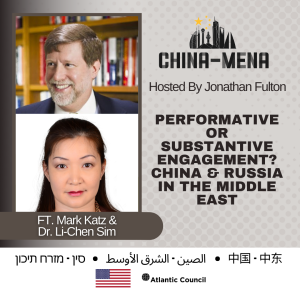
In this episode, our host Jonathan Fulton and guests Li-Chen Sim and Mark Katz explore the growing collaboration between China and Russia and its impact on the Middle East, including the amplification of influence through media collaboration as a force multiplier. We unravel the complexities of Sino-Russian engagement in the region, discussing Russia’s interests, China’s role, the Ukraine war’s influence, and the Middle East perspective: Russia as a muscle and weapon supplier versus China as a financial power. Listen here!
Episode 7: China’s Role and Impact on MENA’s Air Domain
 In this episode, host Jonathan Fulton discusses China’s influence on the air domain in the Middle East and North Africa with guests Assaf Heller and Sarah-Masha Fainberg. They explore Chinese technology transfers and arm exports and implications on the air domain and military capabilities in MENA, Chinese weapon systems, China’s military-civil fusion concerns, and Beijing’s technological influence on the region. Tune in to gain insights into the implications of China’s expanding presence and its effects on military capabilities and hear the experts’ forecast on advanced technology and arms transfers by China. Listen here!
In this episode, host Jonathan Fulton discusses China’s influence on the air domain in the Middle East and North Africa with guests Assaf Heller and Sarah-Masha Fainberg. They explore Chinese technology transfers and arm exports and implications on the air domain and military capabilities in MENA, Chinese weapon systems, China’s military-civil fusion concerns, and Beijing’s technological influence on the region. Tune in to gain insights into the implications of China’s expanding presence and its effects on military capabilities and hear the experts’ forecast on advanced technology and arms transfers by China. Listen here!
Episode 8: Domestic Drivers of China’s Foreign Policy in MENA
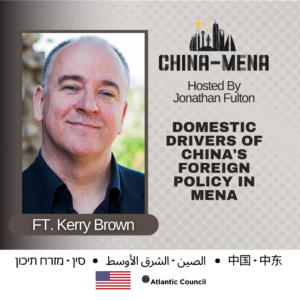 In this episode, host Jonathan Fulton and guest Kerry Brown discuss the domestic drivers shaping China’s engagements in the Middle East. They unravel the complexities of China’s internal landscape, including the middle-class aspirations and interest in international relations and the impact of Xi Jinping’s leadership. Jonathan and Kerry also analyze China’s internal party dynamics and the intimate link between China’s international interests and what serves the party-state’s stability, shedding light on its diplomatic decision-making and potential implications for MENA. Join us for a thought-provoking exploration of China’s foreign policy strategy and domestic underpinnings. Listen here!
In this episode, host Jonathan Fulton and guest Kerry Brown discuss the domestic drivers shaping China’s engagements in the Middle East. They unravel the complexities of China’s internal landscape, including the middle-class aspirations and interest in international relations and the impact of Xi Jinping’s leadership. Jonathan and Kerry also analyze China’s internal party dynamics and the intimate link between China’s international interests and what serves the party-state’s stability, shedding light on its diplomatic decision-making and potential implications for MENA. Join us for a thought-provoking exploration of China’s foreign policy strategy and domestic underpinnings. Listen here!
Episode 9: Middle East Instability – A Chinese Perspective to the Latest Flashpoint
 In this episode of the China-MENA Podcast, titled “Middle East Instability: A Chinese Perspective to the Latest Flashpoint,” our host Jonathan Fulton and Shanghai-based expert Chuchu Zhang explore China’s evolving response to the ongoing instability in the Middle East—including the attacks in the Red Sea and the Palestinian-Israeli conflict— and how they could test US hegemony in the region. Join us to gain valuable insights into Chinese leaders’ perspectives on a US-Centered Middle East and the current Chinese dilemma in the region. Listen here!
In this episode of the China-MENA Podcast, titled “Middle East Instability: A Chinese Perspective to the Latest Flashpoint,” our host Jonathan Fulton and Shanghai-based expert Chuchu Zhang explore China’s evolving response to the ongoing instability in the Middle East—including the attacks in the Red Sea and the Palestinian-Israeli conflict— and how they could test US hegemony in the region. Join us to gain valuable insights into Chinese leaders’ perspectives on a US-Centered Middle East and the current Chinese dilemma in the region. Listen here!
Episode 10: China’s Law of the Sea in the Middle East
 Join us as we dive deep into China’s maritime dynamics with Isaac B. Kardon, a senior fellow for China studies in the Asia Program at the Carnegie Endowment for International Peace. Isaac’s expertise in maritime disputes, global port development, and the People’s Liberation Army Navy sheds light on China’s evolving role in shaping international & MENA waters. Discover Isaac’s groundbreaking book on China’s maritime strategies and delve into his research on China’s impact beyond its shores. Uncover China’s ambitions in global waters, from deep-sea mining to infrastructure development with dual-use functionality to achieve civil-military integration.
Join us as we dive deep into China’s maritime dynamics with Isaac B. Kardon, a senior fellow for China studies in the Asia Program at the Carnegie Endowment for International Peace. Isaac’s expertise in maritime disputes, global port development, and the People’s Liberation Army Navy sheds light on China’s evolving role in shaping international & MENA waters. Discover Isaac’s groundbreaking book on China’s maritime strategies and delve into his research on China’s impact beyond its shores. Uncover China’s ambitions in global waters, from deep-sea mining to infrastructure development with dual-use functionality to achieve civil-military integration.
Tune in for an engaging discussion on China’s maritime might and its implications for the global order and the Middle East and North Africa. Listen here!
Episode 11: The Political Thought of Xi Jinping and Its Impact on MENA
 Join us for this latest episode as we delve into Xi Jinping’s political philosophy and what it means for China, and how it resonates in the Middle East and North Africa. Discover Xi’s doctrine using original research of Xi’s speeches and personal writings and how it propels a new state ideology, autocratic alliances, and conflicts with leaders like India’s Modi.
Join us for this latest episode as we delve into Xi Jinping’s political philosophy and what it means for China, and how it resonates in the Middle East and North Africa. Discover Xi’s doctrine using original research of Xi’s speeches and personal writings and how it propels a new state ideology, autocratic alliances, and conflicts with leaders like India’s Modi.
Delve into power dynamics, internal party debates, Xi Jinping’s quest for superpower status, and where China might be headed in coming years, exploring its impact on the MENA region. Listen here!
Episode 12: China vs. IMEC – The Minilateral Movement in the Middle East
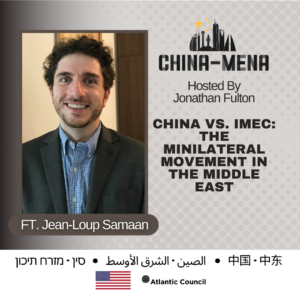 In this episode, Jean-Loup Samaan, a nonresident senior fellow at the Atlantic Council’s Scowcroft Middle East Security Initiative and a research fellow at the National University of Singapore’s Middle East Institute, joins us to dissect the rise of the new minilateral movement in the Middle East, the India-Middle East-Europe Economic Corridor (IMEC), the groundbreaking corridor, and its impact on the region compared to Chinese initiatives. Explore the ongoing significance of IMEC and its uncertainties, including financial concerns. Dive deeper into:
In this episode, Jean-Loup Samaan, a nonresident senior fellow at the Atlantic Council’s Scowcroft Middle East Security Initiative and a research fellow at the National University of Singapore’s Middle East Institute, joins us to dissect the rise of the new minilateral movement in the Middle East, the India-Middle East-Europe Economic Corridor (IMEC), the groundbreaking corridor, and its impact on the region compared to Chinese initiatives. Explore the ongoing significance of IMEC and its uncertainties, including financial concerns. Dive deeper into:
– Shifting Alliances: How is the post-Gaza war landscape impacting Israel’s role in minilateral movements, especially US-led, potentially boosting China’s influence?
– The Abraham Accords Ripple Effect: How did the Accords kickstart and pave the way for a new era of cooperation in the Middle East?
– IMEC’s Impact and France’s Role: Will it become a game-changer for India-MENA trade, and what is France’s strategic engagement in the grouping?
This episode offers a deep dive into the evolving power dynamics of the Middle East, with China, India, and the US vying for influence. Tune in to understand how these minilateral groupings, like IMEC, might reshape the region’s future. Listen here!
Episode 13: The View from New Delhi: Can IMEC rival China’s Belt and Road?
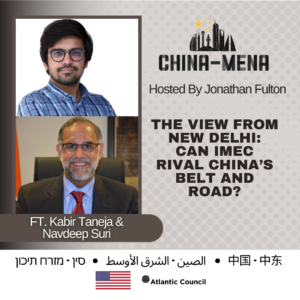 In this episode of the China-MENA podcast titled “The View from New Delhi: Can IMEC rival China’s Belt and Road?”, our host Jonathan Fulton and guests Ambassador Navdeep Suri and expert Kabir Taneja explore the India, Middle East, Europe Economic Corridor (IMEC) and how it may rival China’s Belt and Road Initiative (BRI). We unravel India’s significant strategic interests in the Middle East and how the region perceives India’s expanded role in driving economic prosperity and enhancing regional security.
In this episode of the China-MENA podcast titled “The View from New Delhi: Can IMEC rival China’s Belt and Road?”, our host Jonathan Fulton and guests Ambassador Navdeep Suri and expert Kabir Taneja explore the India, Middle East, Europe Economic Corridor (IMEC) and how it may rival China’s Belt and Road Initiative (BRI). We unravel India’s significant strategic interests in the Middle East and how the region perceives India’s expanded role in driving economic prosperity and enhancing regional security.
Join us for an enlightening conversation that bridges continents and cultures on the China MENA podcast. Listen here!
Episode 14: From the Red Sea to the Indo-Pacific: Expanding Cooperation Between the Gulf and Asia
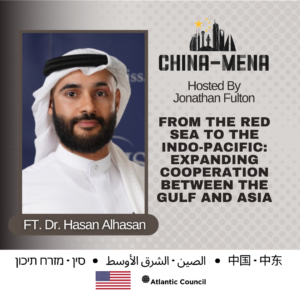 In this episode of China-MENA, titled “From the Red Sea to the Indo-Pacific: Expanding Cooperation Between the Gulf and Asia,” host Jonathan Fulton engages in a compelling conversation with Dr. Hasan Alhasan, a senior fellow at the International Institute for Strategic Studies to discuss the Gulf States’ views on and expanding ties with the Indo-Pacific, the Indo-Pacific’s strategic importance for Gulf security, defense and geoeconomic priorities, and the influence of the US, China, and India on Gulf alliances. They also discuss China’s role in Saudi Arabia’s energy sectors, the impact of Indian and Chinese diasporas in the UAE, and India’s naval presence in the Gulf.
In this episode of China-MENA, titled “From the Red Sea to the Indo-Pacific: Expanding Cooperation Between the Gulf and Asia,” host Jonathan Fulton engages in a compelling conversation with Dr. Hasan Alhasan, a senior fellow at the International Institute for Strategic Studies to discuss the Gulf States’ views on and expanding ties with the Indo-Pacific, the Indo-Pacific’s strategic importance for Gulf security, defense and geoeconomic priorities, and the influence of the US, China, and India on Gulf alliances. They also discuss China’s role in Saudi Arabia’s energy sectors, the impact of Indian and Chinese diasporas in the UAE, and India’s naval presence in the Gulf.
Join us to understand how Gulf-Asia cooperation addresses future challenges and opportunities, from the Red Sea to the Indo-Pacific and beyond. Listen here!
Episode 15: Unpacking Influence: China’s Impact on US Strategy in the Middle East
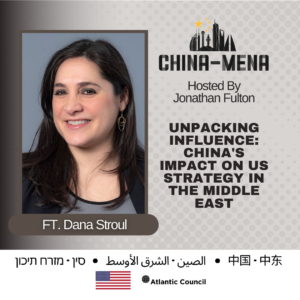 In this episode of China-MENA, titled “Unpacking Influence: China’s Impact on US Strategy in the Middle East,” join our host Jonathan Fulton featuring Dana Stroul, director of research and senior fellow at the Washington Institute for Near East Policy and former Deputy Assistant Secretary of Defense (DASD) for the Middle East, as they explore China’s evolving role and its impact on US policy in the Middle East and North Africa. This episode delves into global partnerships like the US-UAE-G42-Microsoft collaboration, the strategic significance of 5G technology and cloud computing, and the role of China on Iran’s behavior changes. Among others, Dana also discusses:
In this episode of China-MENA, titled “Unpacking Influence: China’s Impact on US Strategy in the Middle East,” join our host Jonathan Fulton featuring Dana Stroul, director of research and senior fellow at the Washington Institute for Near East Policy and former Deputy Assistant Secretary of Defense (DASD) for the Middle East, as they explore China’s evolving role and its impact on US policy in the Middle East and North Africa. This episode delves into global partnerships like the US-UAE-G42-Microsoft collaboration, the strategic significance of 5G technology and cloud computing, and the role of China on Iran’s behavior changes. Among others, Dana also discusses:
- The China-Arab States Cooperation Forum
- How to safeguard strategic partnerships amidst China’s rise
- Contrast between China and US infrastructure support
- Evasion of sanctions: Iran, Russia and China
Join us for an insightful discussion on the future of US and its strategic goals in the region. Listen here!
Managed by
A Scowcroft Middle East Security Endeavor

The Scowcroft Middle East Security Initiative (SMESI) provides policymakers fresh insights into core US national security interests by leveraging its expertise, networks, and on-the-ground programs to develop unique and holistic assessments on the future of the most pressing strategic, political, and security challenges and opportunities in the Middle East.








